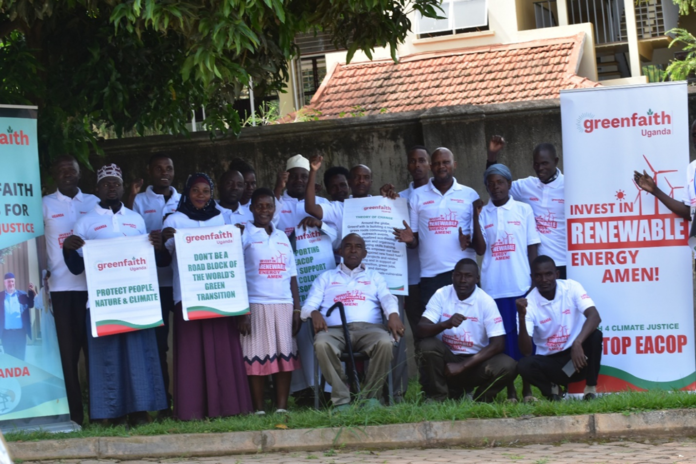
Greenfaith Uganda has trained leaders of its circles in Greater Masaka Region of Central Uganda on Communication Campaign Strategy.
The two-day training held at Courtlane Hotel in Masaka was attended by circle leaders from the central Uganda districts of Masaka, Sembabule, Kyotera, Lwengo, Rakai and Mpigi.

The training aimed at equipping the leaders with communication skills for climate justice and human rights protection in the wake if increased environmental degradation and its visible impact to livelihoods.
Mr Maxwell Atuhuura, the Greenfaith Uganda, Country Representative, said that they conducted the training in Greater Masaka to improve community participation in mitigation of the side effects of the East African Crude Oil Pipeline (EACOP) project.

He added that this is why they are supporting the Stop-EACOP campaign in fear of continued human rights violations and environmental degradation.
“Masaka had fertile soils with a lot of Matooke and other types of local food but now the trend changed due to climate change which has been caused by human activity,” he said.
The Country Representative said that as everyone is aware that TotalEenergies – a company which deals in oil and gas with the government of Uganda started several oil projects and among them is the East African Crude Oil Pipeline (EACOP) Project.
The EACOP has its terminal in the Albertine region of western parts of Uganda to Tanga in Tanzania.
He claimed that the oil pipeline project has caused a lot of havoc to the climate of Uganda many forests having been cut down and land degraded.
“Many people have been affected by the project which created our interventions as climate activists in Uganda to come out against the EACOP project,” said Mr Atuhuura.
He added that Greenfaith found it necessary to equip those people with knowledge and skills on how they can work together to see that they can save the environment as well as people’s rights.
Participants were trained on communication campaign strategy, public speaking and presentation skills, social media engagement and digital and physical security.
The trainees were supported to open up emails and social media accounts either for an individual or a circle.
During the training, the EACOP project affected persons including Mr Richard Kisakye expressed their dissatisfaction over the compensation packages given by the EACOP project for their properties.
“The compensation rates were very low for my land and crops like coffee. I was not satisfied and feel my rights were violated,” he said.
He said that his land was a continuous source of livelihood for him but now taken forever.
Ms Zaina Namatovu, another EACOP project affected person, appreciated Greenfaith for the training saying it helped them to understand how to use digital platforms and share information about their dissatisfaction.
“The money given to me as compensation for my house could not enable me to replace that house,” she said.
The EACOP and the government of Uganda have always said that they used the appropriate compensation rates approved by the Chief Government Valuer (CGV) working together with the relevant Local Government authorities for properties like crops and semi-permanent structures.
The government and the EACOP developers have been dismissing claims that the EACOP will negatively affect the environment saying they followed the Environmental and Social Impact Assessment (ESIA) report to mitigate its effects.








































![Turn to what influences journalism in Uganda today [Opinion]](https://kazi-njemanews.com/wp-content/uploads/2024/05/Walukamba-218x150.jpg)
![NAM’s potential should catalyse access to clean, affordable energy [OPINION]](https://kazi-njemanews.com/wp-content/uploads/2024/01/LOIS-soft-218x150.jpg)




